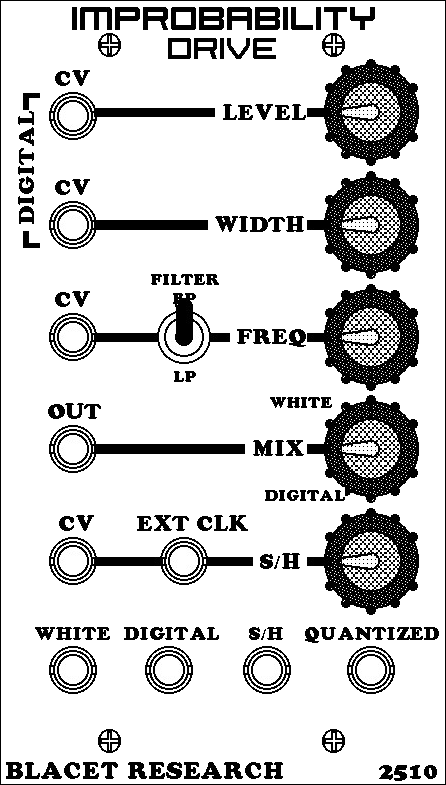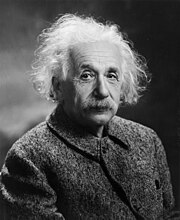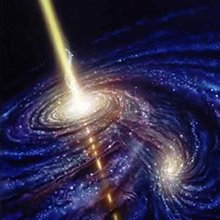Idealism Gone Bad
© Charles ChandlerModern astronomy has become a very strange thing indeed. Nothing makes sense anymore. Time and space are getting warped, and sometimes disappear altogether, perhaps reappearing somewhere else, and it's all very mind-bending. It actually seems that scientists are not even bothering to look for rational explanations anymore. Everything has to be weird, and the weirder the better. (Did somebody engage the Improbability Drive?)For example, we are told that in a black hole, the force of gravity becomes so great that it overpowers all other forces, and the laws of physics just break down. Matter and energy are crushed into a singularity. This, of course, begs the question of why there would be anything at all left in the Universe, after billions of years of these things gobbling up everything in sight. So we are told that matter falling into a black hole probably shoots through a wormhole, reappearing somewhere else, like in a supernova or something. This would seem odd, but once we have already accepted an impossibility (i.e., gravity crushing matter into a singularity), it just seems normal that the matter would spring back to life somewhere else. But if the only way to reconcile the first impossibility is with yet another, we're probably getting further from reality.Do astronomers care? Apparently not. The consensus is that conventional physics just doesn't work at the astronomical scale, and lots of weird stuff happens out in space. But how did they arrive at that? They looked through a telescope and saw something unexpected, and immediately concluded that physics gets strange at great distances? That's ridiculous. Science didn't used to be like this. We pay these people to gain knowledge and understanding, and to share it with us. We all want to embrace the world in which we live, and we can do this with confidence if we understand it. But when scientists say that all of the rules are broken, and nothing makes sense, and that's been the consensus for over 100 years now, and it doesn't look like this will ever change, that's just not useful information.Of course, they'd have a little something if they did it like science fiction. Then it would be entertaining, at least for people who enjoy having their imaginations stretched every once in a while. But we can get better entertainment from Hollywood, and for less money. Why would we pump billions of dollars into research every year, if all we get is poorly written documentaries narrated by people who don't know how to act, if it's all just science fiction anyway?Obviously this is not the first time that this question has been asked, because now they're getting A-list actors to do the documentaries.
The Science Channel's "Through the Wormhole" series. Be sure to watch the "What Do Aliens Look Like?" and "Will We Survive First Contact?" episodes, and try to find the line between science and fiction. But aside from the entertainment factor, what's the value in this? Star Wars re-runs get higher ratings.Whose idea was this anyway?The current trend started with Einstein. And of course nowadays we are taught that he was the greatest genius of all time. So if a genius said it, it has to be true. The interesting question concerns how Einstein came to be considered a genius in the first place. Why did the scientific community latch onto the strange contortions of general relativity? Previous generations insisted on clarity, and would have dismissed Einstein as a quack.
Albert Einstein (1879~1955)
Sir Isaac Newton (1642~1727) To understand Einstein, we have to understand the true genius who preceded him. In 1687, Sir Isaac Newton published his theory of universal gravitation, and his canonization of the laws of motion, which laid the foundation for classical mechanics.1 But Newton didn't just assist in several major advances. He did so many things that it established a platform for further scientific inquiry. And he showed us how he did it. Essentially, he taught us how to think scientifically, and convinced us that these methods could be applied to everything. By the early 1800s, practical applications of Newtonian principles were emerging so rapidly that the period became known as the Industrial Revolution, which produced an enormous amount of value for all of humankind.The problem is that Newton didn't figure out everything. In the mid-1800s, scientists were making great strides in the study of electromagnetism, with vast implications for atomic theory and the new chemistry based on it. In no sense did Newton anticipate such work. In the early 1900s, scientists had discovered protons, neutrons, and electrons, and were beginning to understand nuclear forces. Newton didn't anticipate any of that either. As a consequence, scientists asserting the existence of non-Newtonian forces were met with suspicion and contempt. At that point, Newton's overwhelming credibility had actually become the limiting factor in the progress of science.Then Einstein discovered a way around all of that. The best way to understand his technique is to scrutinize his trademark formula, E = mc2, first published in 1905.2 What exactly does that mean? First we should remove the speed of light, as it is irrelevant. Any equation in three variables, where one of them is a constant (i.e., the speed of light), is just a units conversion formula. So the speed of light does nothing in that equation that couldn't be accomplished just by redefining the base units for energy and/or mass. That leaves simply the equivalence of energy and mass. Einstein was working on a unified field theory, thinking that if he could prove that electromagnetic and nuclear forces were all just different flavors of gravity, the new discoveries would pass the Newtonian test, and be admitted into the mainstream. Well, that didn't go anywhere (and still hasn't), but tinkering with it, Einstein found a way to cheat on the test. But again, to understand Einstein, we have to go back to Newton.In classical mechanics, Ek = ½·m·v2. This is intuitively accessible, even to those who cannot decipher the formula. A hammer has energy that is proportional to the mass of the hammer, and how fast you swing it. If you want more energy, you swing it faster, or you get a bigger hammer. Now Einstein says E = mc2. Interestingly, this sounds Newtonian, and people think that they understand. Yet it takes physics to the next level, and wow, that's a lot of energy! Instantly, scientists get the approval to pursue this new paradigm. In other words, Einstein didn't fight the giant — he pretended that he was standing on the shoulders of the giant. And it worked famously. Never mind that he couldn't prove the equivalence of energy and mass. At that point, Newton had been dead for 150 years, and people were ready for something new. They were suspicious of anybody who disagreed with Newton, considering all of the value that had been produced by classical mechanics. But when somebody said that Newton had no idea how right he was about the relationship between energy and mass, while the relationship is actually simpler and more direct, and it's actually E = mc2, meaning that there is an unbelievable amount of untapped energy stored just in the matter itself, everybody chomped on it.Similarly, astronomers were finding things that defied classical mechanics, but they couldn't argue with Newton. They turned to Einstein for help, and found the answer in general relativity — sometimes, there is so much gravity that it breaks all of the other laws of physics, and things get really weird. Don't argue with Newton, just extend him, and don't be scared of taking it to the illogical extreme. And that, too, worked really well. Before long, this new "physics" was loosening all kinds of purse strings, and scientists quickly got in line behind Einstein. In this way, the scientific community arrived at the conclusion that Einstein was the greatest genius of all time.But nobody realized the long-term implications of Einstein's work. The bastardizations of Newtonian physics got written into their charter. Credibility is the limiting factor in scientific research. Having made a name for themselves by adding a few new twists to classical mechanics, they would never be able to get the twists out. Now there are two "principles" that simply cannot be challenged: E = mc2, and gravity is the most powerful force in the Universe. Yet both of these are false.
Black hole with polar jets. Furthermore, adding new work to a twisted foundation means adding new twists that look like they belong on top of what's already there. So modern scientists attempting to extend Einstein feel compelled to come up with stuff that's even more mind-bending than even Einstein would have tolerated. For example, Einstein didn't believe that black holes would crush atoms, because he thought that the centrifugal force of matter spiraling inward would prevent it.3 But if gravity can overpower anything, that includes inertial forces, and matter being crushed into a singularity is mind-boggling, which in modern science is a Good Thing, so they all got to work on the demonstration that black holes are predicted by general relativity. Standing on Einstein's shoulders, modern scientists can now say with a high degree of arrogance that gravity can create such singularities, and the detection of supermassive gravitational fields at the centers of galaxies that do not emit photons proves that Einstein did not realize how correct general relativity actually was.So now, the more mind-bending the construct, the better, limited only by the general public's willingness to believe. And this continues to work famously.It's interesting to consider the possibility that Einstein knew that the source of his fame was a well-executed publicity stunt, while he actually spent most of his time attempting to find the rational bedrock underlying all of these strange new non-Newtonian forces. So he thought that telling a few little white lies (E = mc2, and gravity is God) was OK if it bought his generation the time to develop a solid foundation for future scientific advances. But the next generation was not more honest.With the advent of Big Science, publicity stunts are no longer things that have to be done just every once in a while, to bridge gaps that will be filled in later. Rather, science is now run like a business, where funding is directly proportional to credibility, and publicity stunts are like "products" that are sold for money. Unfortunately, in the absence of integrity, a business based entirely on credibility quickly turns into a scam. We know that we have reached this point when we see astronomers challenging the consensus being denied telescope time. A healthy discipline encourages dissent, but a scam only works if everybody goes along with it, so that's how we know it's a scam. This means that there isn't going to be any filling in the gaps later, because it would conflict with the publicity stunts that are the source of the funding. When a scam precludes decent work, it's not just little white lies covering deeper truths. It's all just lies. For those willing to believe them, and who find them entertaining, and are willing to pay dearly for them, they work. Others find the disingenuous fabrications of the modern scientific community to be simply insulting.
References
1. Newton, I. (1687): Philosophiæ Naturalis Principia Mathematica. New York: Daniel Adee ⇧
2. Einstein, A. (1905): Does the Inertia of a Body Depend upon its Energy-Content? Annalen der Physik, 18: 639-643 ⇧
3. Einstein, A. (1939): On a Stationary System With Spherical Symmetry Consisting of Many Gravitating Masses. The Annals of Mathematics, Second Series, 40 (4): 922-936 ⇧















